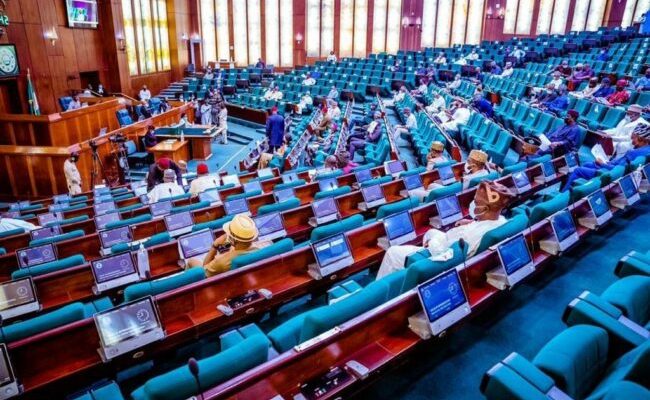
Members of the House of Representatives on Wednesday expressed support for a bill seeking to impose 14 year imprisonment without option of fine for anyone found culpable of sexual harassment across the country.
As stipulated in Clause 4 (i, ii and iii) of the bill titled: ‘Commencement of Criminal Proceedings’, “A written sexual harassment petition complaining of the offence or felony of sexual harassment against an educator may be filed or made by a Student or by a Student’s representative who may be a relative, a guardian, or a lawyer of the Student, or any person who has interest in the wellbeing of the Student to the Nigerian Police Force, or the Attorney-General who shall take necessary measures to prosecute the educator in accordance with the provisions of this Bill.

“A copy of the written Sexual Harassment Petition complaining of sexual harassment in Clause 8 of this Bill shall be delivered by the student or the student’s representative to both the administrative head and Secretary of the Independent Sexual Harassment Committee of the affected institution for record purposes and such actions that may be required under this Bill.
“Criminal proceedings shall commence or be deemed to have commenced under this Bill when a charge has been filed in Court and the processes served on an educator who is alleged to have committed a sexual harassment offence under this.
Clause 5 of the bill titled: ‘Penalty’, provides that: “Any person who commits any of the offences or acts specified in Clause 4 (1), (2) and (3) of this Bill is guilty of an offence of felony and shall, on conviction, be sentenced to an imprisonment term of up to 14 years but not less than 5 years, without an option of a fine.
“Any person who commits any of the offences or acts specified in Clause 4(4), (5) and (6) of this Bill is guilty of an offence and shall be liable on conviction to imprisonment term of up to 5 years but not less than 2 years, without an option of a fine.”
Clause 6 on ‘Civil Action for Breach of Fiduciary Duty’, provides that: “Notwithstanding the provisions of Clauses 4, 8, 9, 10, 11 and 12 of this Bill or any other part of this Bill thereof, the right of a student who complains of or alleges sexual harassment by an educator to commence and maintain a civil action in Court for breach of fiduciary duty of care contrary to Clauses 2 and 3 of this Bill is preserved.
ALSO READ: VIDEO: Trump rides in garbage truck after Biden calls supporters ‘Garbage’
The standard of proof in any proceedings for an educator’s breach of the fiduciary duty owed to a student under Clauses 2 and 3 of this Bill shall be the same standard applicable in all civil proceedings.”
Clause 7 of the bill which focused on ‘Institutional Disciplinary Measures’, States that: “Nothing under this Bill shall preclude an institution from proceeding under its established policies, rules and regulations for the internal administrative discipline of its staff and students, provided that: (a) Where criminal proceedings have been commenced under this Bill or pending in a Court in respect of a complaint of sexual harassment of a student by an educator, no disciplinary body including an Independent Sexual Harassment Prohibition Committee in an institution shall have the power to commence or continue disciplinary proceedings or render any decision in respect of the acts or offences complained of;
Where a student makes a Sexual Harassment Complaint against an educator, an institution’s Independent Sexual Harassment Prohibition Committee established under this Bill shall investigate, determine and render a final decision on the merits of the complaint in line with the — provisions of this Bill.
In determining a complaint of sexual harassment, provision of this Bill shall supersede any existing policies, rules or regulations for internal administrative discipline of its staff and students.
“Where an Independent Sexual Harassment Prohibition Committee established under this Bill has concluded its investigative proceedings and rendered a final decision, such proceedings or decision shali not operate to bar or prevent criminal prosecution or civil proceedings in a Court (for acts] of sexual harassment under this Bull.
“Where internal administrative or disciplinary sanctions are imposed by a Sexual Harassment Prohibition Committee against or on an educator in accordance with the provisions of this Bill before commencement of criminal proceedings, a Court, in passing sentence, shall have regard to the sanctions already imposed on the educator.
Clause 8 of the bill which focuses on ‘Independent Sexual Harassment Prohibition Committee’ provides that: (i) The administrative head of an institution shall establish an Independent Sexual Harassment Prohibition Committee in consultation with the highest management body of the institution.
“The membership of the Sexual Harassment Prohibition Committee shall be seven staff members of the institution, including a Chairman who shall not be less than the rank of a senior lecturer or a deputy director in the federal civil service and a Secretary who shall not be less than the rank of a lecturer oran assistant deputy director in the federal civil service.
“The membership of an Independent Sexual Harassment Prohibition Committee shall at any material time consist of at least two students, two non-academic staff members and two academic staff members of the institution and shall include at least three women or females.
“An administrative head of an institution who fails to comply with the provisions of sub-clauses (1) and (2) of this Clause of this Bill is guilty of an offence and shall be liable on conviction to a minimum fine of N5,000,000 or imprisonment for 5 years, or both.
“An Independent Sexual Harassment Committee shall be independent and impartial in all its dealings, proceedings and affairs.
“The members of an Independent Sexual Harassment Prohibition Committee shall be persons of high moral standing and good reputation.
“The Chairman and every Member of an Independent Sexual Harassment Prohibition Committee shall hold office for such period, not exceeding two years, from the date of their appointment as may be specified in writing by the administrative head.”
However, Clause 12 of the bill which focuses on ‘Liability for false Complaint’, provides that: (a) Where at the completion of an investigation into a Sexual Harassment Complaint, an Independent Sexual Harassment Prohibition Committee finds or determines in its final decision that the complaint is false and malicious, the Committee may, recommend sanctions to the administrative head against the student who made the complaint, which may include suspension of the student provided that failure to prove an allegation of sexual harassment shall not be conclusive to establish that the complaint is false or made with malice or prevent further investigations or criminal prosecution of an educator for the offence alleged to have been committed contrary to any provisions of this Bill.
“An administrative head shall implement the final decision or recommendations of an Independent Sexual Harassment Prohibition Committee if, after 21 working days of the Committee’s final decision or recommendations, an educator or student did not bring an action in Court for a judicial review of the final decision or recommendations.”







